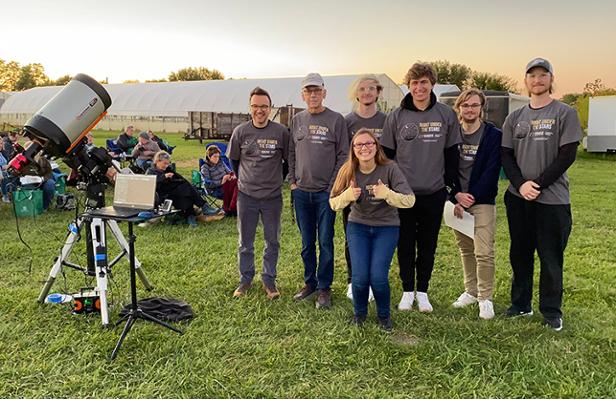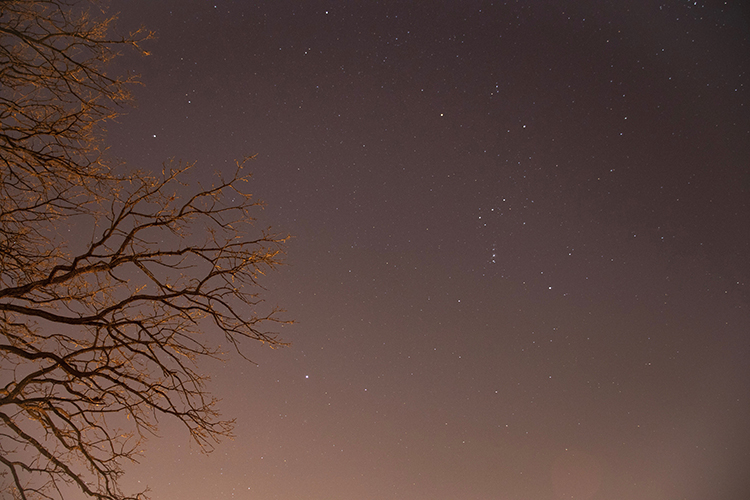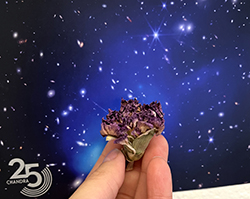
Student stargazers:
Purdue Astronomy Club aims to bring the universe to fellow Boilermakers
Written by Cheryl Pierce
On an icy cold morning at 5 a.m. November 8, 2022, Dylan Caudill ventured out into the frigid air with friends he’d met at Purdue University. He became interested in astronomy while at Purdue and joined the Purdue Astronomy Club (PAC). Going out into the crisp darkness, he and members of the student club witnessed a spectacular view of a lunar eclipse. He says it was this moment that really drove home for him the “why” in “why do we do what we do?”
Caudill, a senior undergrad studying Applied Physics specializing in Astronomy, is the current president of PAC. He has his sights set sky high at Purdue by getting involved in astronomy related research. He currently works with Jeffrey Gerber, continuing lecturer, conducting stellar astronomy research - characterizing flare rates of M-dwarf stars that were simultaneously observed by space telescopes. His love of astronomy is newly formed as it wasn’t until he reached Purdue that he developed an interest in the science of the sky.
“I became interested in astronomy during my time at Purdue. Taking my first course hooked me into the field and set me on the path to pursuing it for the rest of my academic career,” he says. “I became involved with the club through the invitation of a great friend that I made in those early astronomy classes.”
The club seeks to involve undergrads in all things astronomy. It currently has 632 members, many of which attend the various events hosted by the club. It is a completely free, totally accessible, no pressure club that allows students from any major to take part. The faculty advisor for the club is Dr. David Sederberg, outreach coordinator for Purdue’s Department of Physics and Astronomy. Students seeking to join the club can find information on its boilerlink page. There that they will meet PACs team members and be offered a link to the club’s Discord channel. This allows students to keep in touch with upcoming sky-watching events and meet-ups.
PAC seeks to be a club that invites all students to gaze at the sky through telescopes and strives to pass their love of the sky to others. Ethan Pinarski, also a senior undergrad seeking an Applied Physics major, is the club’s Outreach Coordinator. He also served as the Vice President of the club for two years previous. He studies astronomy and astrophysics with his main focus of study involving tracing the large-scale structure of the Universe using Lyman-α emitting galaxies and also studies supernova remnants in another research group.
“I have always had an interest in astronomy, but what really pushed me into studying it was my high school's astronomy club and the outreach events I went to at a local observatory,” says Pinarski. “I got my first telescope shortly thereafter, and the rest is history. I got involved with PAC through the B-involved fair during my freshman year. I went to the stargazing events and eventually ran for office.”


Caudill credits the club’s latest successes to Amelia Binau who started her presidential run of the club back in 2021. He said the club is what it is today because she helped revive a club that went somewhat dormant at the time she joined. She is the current Vice President of PAC and was President for two years. She is also a senior undergrad studying Applied Physics. She credits the movie Interstellar for propelling her love of astronomy but says that the basic principles of science drew her to the complexities of the sky.
“I'm a person who is very grounded in the outdoors, nature, and the natural world/environment and my entire life, I've had a tendency to analyze anything in the natural world I could get my hands on,” says Binau. “I'd collect rocks, leaves, and insects and organize them, quantify their qualities, and classify them accordingly… this is something I still do as a hobby. This is the same research process astronomers use to understand astronomical objects, so my interests in astronomy followed naturally from this.”
Binau says PAC is socially-oriented, laid-back, due-free, and open to all. The goal is to allow everyone, regardless of experience or background, to experience astronomy first-hand. If students would like to become more involved, she encourages them to email herself or Caudill.
“Our main goal is to give everyone the chance to look through a telescope and help them discover an appreciation for the universe,” says Pinarski. “We cater to complete beginners, all the way up to astronomy minors and long-time astrophotographers. I think my favorite memory of this club might be when we helped run the ‘Explore the Universe’ event during the 2023 Boiler Gold Rush. I was astonished to see hundreds of students from all backgrounds coming to gaze upon the night sky through telescopes. We saw nebulae, star clusters, star clouds, and much more that night. The people who stopped by had great questions, and we were all happy to answer.”
One of Binau’s favorite memories of PAC involved helping students see the stars who were never before able to see them clearly due to living in an urban area.
“During one stargazing event about a year ago, a group of girls gave me a carnation,” she says. “They explained that in the city they grew up in, they could never see the sky in such detail as they could here due to light pollution, and thanked PAC for the experience. I keep the flower as a reminder that my goal as a scientist is to help others through the creation of knowledge, inspiration, and understanding.” (would love a photo of the flower in your hands if that is at all possible.)

Due to the fact that all three students are in their final year as an undergraduate at Purdue, they are thinking ahead in hopes of preserving the club for the next generations of Boilermakers. They currently have three telescopes but two have fallen into disrepair due to use. They have applied for grants to help maintain these telescopes or to purchase more.
“We have been working through the SOGA grant system to attempt to gain new equipment for specific events during the various cycles. So far, our events have been unsuccessful, however we remain encouraged to keep trying to provide the best experience for our members,” explains Caudill. “The reality is that much of our equipment is worn down from years of usage and cannot sustain major events which causes us to frequently rely on contributions from our members. Once these students move on from Purdue, we worry about the sustainability of the club given the status of what we have. We are doing the best that we can to make the most efficient use out of our time here and spread the wonders of astronomy to the student body. This is the major reason why we host free events, but this is getting increasingly difficult to do as time goes on and the current bank of funding decreases. For the sake of our members, we hope that we can continue to provide an amazing, free experience to our members, but without support from grants and members, this may not be possible in the years to come.”